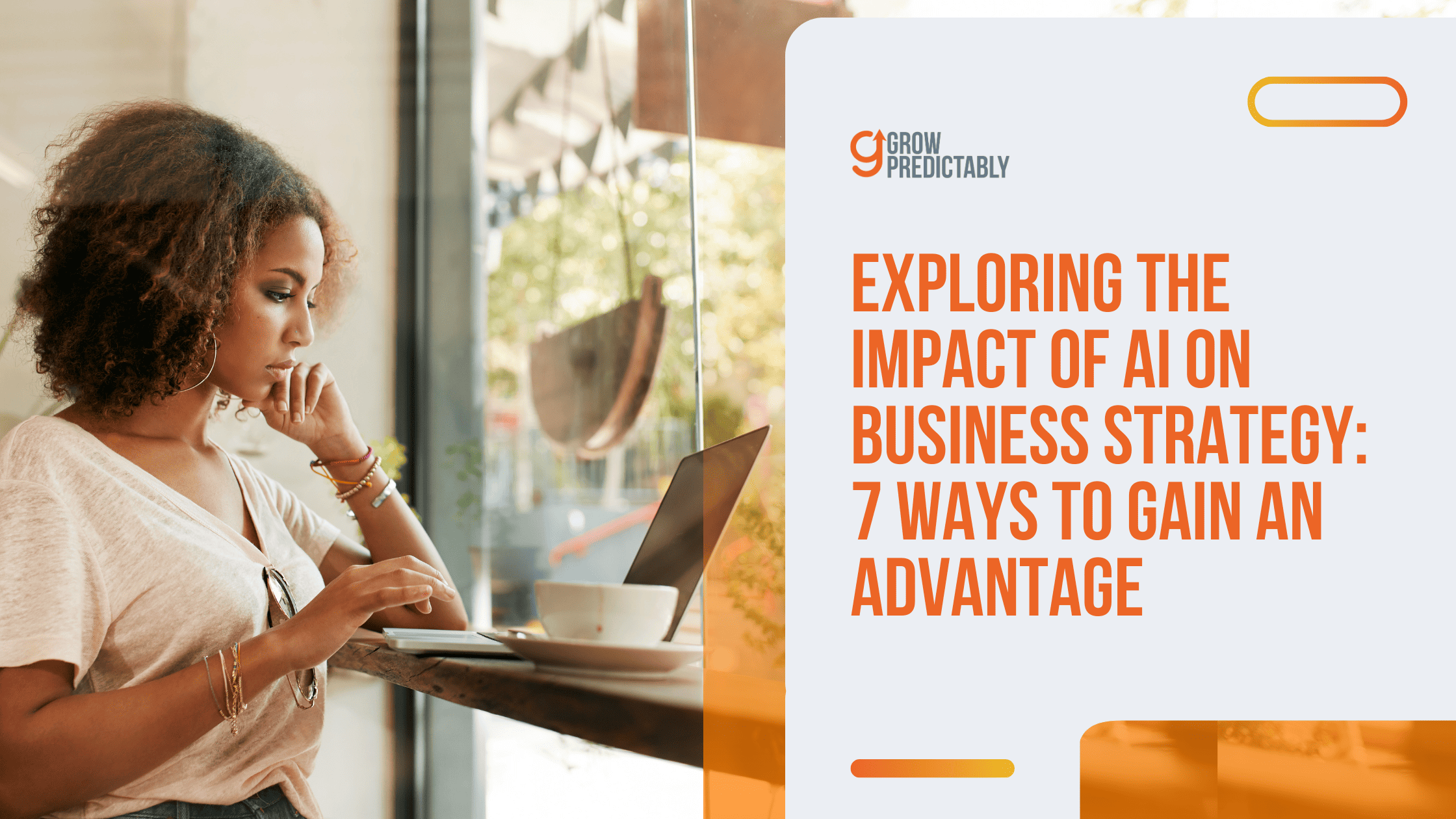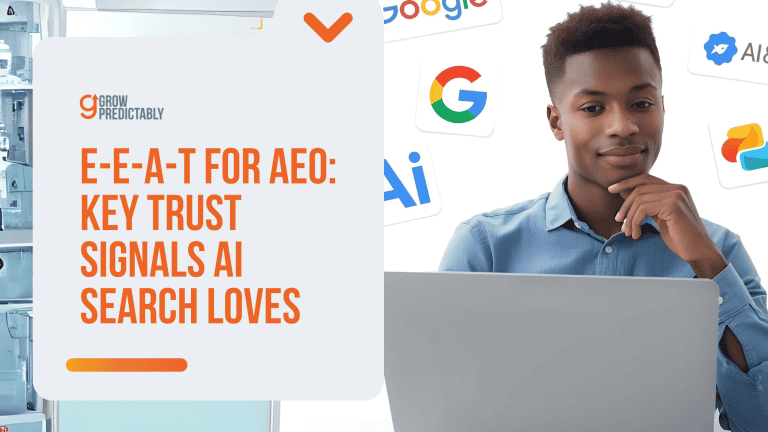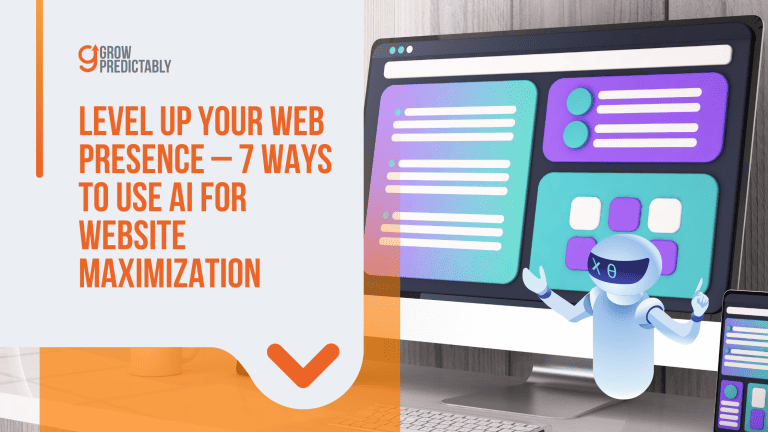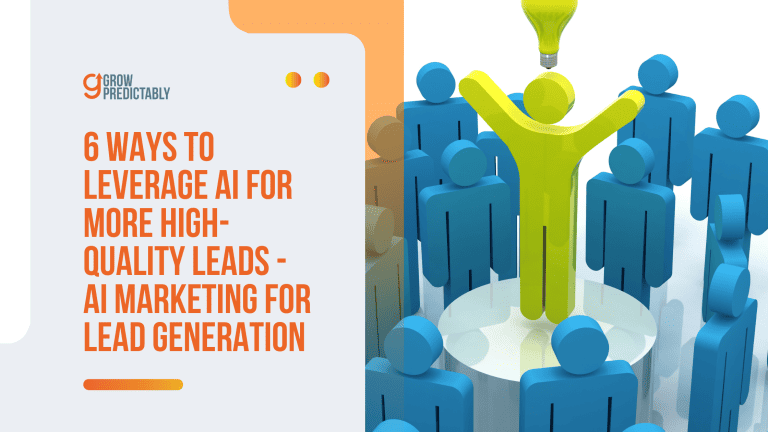Exploring the Impact of AI on Business Strategy: 7 Ways to Gain an Advantage
Let’s face it – as a business owner, you’re constantly juggling multiple tasks at once. And while this makes some of us well-rounded, there are also disadvantages to spreading yourself too thin in business.
In recent years, however, we’ve seen modernization take another big step forward.
With its advanced capabilities, AI has helped streamline many business operations and free up time for professionals to dedicate more of their energy and expertise to critical tasks.
Today, we’ll go over seven practical ways to maximize the impact of AI on business strategy.
From automating repetitive tasks to taking innovation to new heights, we’ll cover the important areas of your business that AI can augment and take to the next level.
But first, let’s understand a little bit more about AI’s potential…
Why is AI relevant in strategy making?
Artificial intelligence is revolutionizing how businesses strategize and make decisions. AI equips managers and decision-makers with data-driven insights, enabling them to make more informed choices, predict market trends, and optimize operations.
This technological advancement not only enhances internal processes but also empowers businesses with competitive intelligence.
Competitive intelligence, which refers to a business’s ability to identify, highlight, and leverage market trends and patterns, is crucial for gaining a competitive edge.

By harnessing the power of AI, businesses can better understand their competitors, anticipate market shifts, and position themselves advantageously.
This synergy between AI and competitive intelligence is evident in the potential economic impact AI is projected to have.
According to Forbes, AI will have an estimated 21% net increase in the United States GDP by 2030, underscoring the transformative role of AI in driving business performance and economic growth.
How is AI Influencing Business Strategies?
AI has become a powerful tool for businesses, enabling them to transform and optimize many of their operations. By leveraging AI’s predictive capabilities, businesses have been able to make better predictions and decisions than ever before.
Adopting AI solutions into your business can augment strategies in areas like:
- Customer Service
- Customer Relationship Management
- Digital Marketing
- Task Automation
- Research and Product Development
- Talent Acquisition
- Business Analytics
- Finance and Budgeting
Integrating AI solutions into these business facets has brought unchartered benefits to many businesses in recent years, enhancing various aspects of operations.
From bolstering customer service to fine-tuning financial strategies, AI has the potential to bring significant improvements to your business processes regardless of your industry.
While these applications highlight the incredible potential of AI, businesses new to this technology may wonder how to kickstart a proficient AI integration.
Here’s a roadmap to guide you on your AI journey:
1. Define Clear Objectives: Start small and identify specific business goals that align with your budget and resources. Whether it’s improving local customer satisfaction or streamlining internal processes, having clear objectives will guide your AI implementation strategy.
2. Data Collection and Quality: Focus on collecting and maintaining high-quality data relevant to your niche market. You don’t need vast datasets; you need accurate and relevant information.
3. Talent and Training: Consider hiring or outsourcing AI expertise on a project basis, or train existing employees in AI fundamentals. Look for cost-effective training options and local talent pools.
4. Select the Right Tools: Choose AI tools and platforms that suit your budget and scale. Explore cost-effective cloud-based AI services or consider low-code AI development platforms to keep costs down.
5. Start Small: Begin with pilot projects that align with your budget and goals. Test AI applications in controlled environments to minimize risk and learn before scaling up.
6. Ethical Considerations: Be mindful of ethical considerations, especially data privacy, even on a smaller scale. Implement responsible AI practices to build trust with your customers.
7. Monitor and Adapt: Continuously monitor AI performance, gather feedback, and adapt to your evolving business needs. SMBs often thrive on agility and adaptability.
Now that we’ve covered how AI influences the different departments of a business, let’s look at some real-world examples of how AI actually helps business operations.
7 Real Word Examples of The Impact of AI on Business Strategy
Ready to turbocharge your business strategy with AI? Here are seven examples of companies (brands we all probably have heard of already) that took their operations to the next level with the help of artificial intelligence.
Let’s start off with the app that’s probably right inside your phone.
1. Enhance Customer Experience
One company that has harnessed the power of AI marketing to enhance customer experience is Spotify, the global music streaming giant. According to its official newsroom, Spotify uses AI to deliver personalized listening experiences to over 320 million users worldwide.

The algorithm considers factors such as the genres you listen to, the artists you follow, and even the specific songs you’ve played on repeat. It then cross-references your musical taste with other users with similar preferences and suggests songs they’ve enjoyed.
This personalized approach has been a massive success for Spotify. A study from The University of Pennsylvania Wharton School found that users of Discover Weekly were more likely to seek out variety in their music choices and were more loyal to the platform.
If you aim to emulate Spotify’s approach to enhancing customer experience, one area to really focus on is personalized experiences. How?
- Data Collection – Begin by collecting relevant data from your customers. This data can include their preferences, purchase history, browsing behavior, and any other information that can help tailor recommendations.
- Implement AI Recommendation Algorithms – Utilize AI-powered recommendation algorithms. Many cloud-based AI platforms offer pre-built recommendation models that can be integrated into your website or app.
- Personalize Product/Content Suggestions – Use AI algorithms to analyze the data collected and generate personalized product or content suggestions for each customer. These suggestions could include products, services, articles, or anything that aligns with your business.
- Seamless Integration – Ensure that the personalized recommendations seamlessly integrate into your customer touchpoints, such as your website, app, or email campaigns. Customers should see these suggestions wherever they engage with your brand.
- Customer Feedback and Iteration – Continuously gather feedback from customers regarding the recommendations. Use this feedback to fine-tune and improve the accuracy of your AI algorithms over time.
- Encourage Data Sharing – Encourage customers to share more data with your business by providing immediate benefits. For example, offer exclusive discounts, early access, or personalized experiences in exchange for their data.
- Measure and Optimize – Regularly measure the impact of personalized recommendations on customer engagement, conversion rates, and overall satisfaction. Use these insights to optimize your AI-powered recommendation system further.
- Promote Sharing and Engagement – Create initiatives similar to Spotify Wrapped. At the end of each year or on special occasions, give customers personalized reports or summaries based on their engagement with your brand. Encourage them to share these with others, thus expanding your reach.
2. Improve Operational Efficiency
One standout example of a company using AI to enhance operational efficiency is Amazon, the global e-commerce titan.

According to a report in The New York Times, Amazon has over 200,000 mobile robots working in its warehouses globally.
These robots, known as “drive units,” help in storing and retrieving packages. They move shelves of products to human pickers, who then grab the necessary items to fulfill an order. This collaboration between humans and robots significantly reduces the time to process an order and increases warehouse storage capacity.
To copy Amazon’s use of AI to enhance operational efficiencies, focus on demand forecasting. How?
- Data Collection – Collect historical data on your business operations, specifically on sales, customer orders, and inventory levels. Ensure that the data is well-organized and accessible.
- Choose an AI-Based Tool – Look for user-friendly AI-powered forecasting tools or software that cater to small and medium-scale businesses. Many cloud-based AI solutions offer straightforward interfaces and pricing structures suitable for your scale.
- Data Input – Import your historical data into the AI tool. These tools typically have user-friendly data upload features that don’t require advanced technical skills.
- Set Parameters – Configure the tool by specifying relevant parameters such as your products or services, time periods, and desired forecasting accuracy level. Adjust these settings according to your specific business needs and goals.
- Generate Forecasts – Run the AI forecasting model. Most AI tools provide easy-to-understand forecasts and insights, often in the form of charts or reports. These insights will help you anticipate demand fluctuations more accurately.
- Plan Inventory and Operations – Based on AI-generated forecasts, adjust your inventory levels and operational plans accordingly. This will prevent overstocking or understocking, optimize your resources, and improve efficiency.
- Monitor and Refine – Continuously monitor the accuracy of the AI-generated forecasts. Adjust the parameters and settings as needed to improve accuracy over time. Many AI tools can learn from new data and refine their predictions.
3. Automate Routine Tasks
One significant benefit of AI is its ability to automate routine tasks, freeing up employees’ time for more complex and strategic work. A notable example of a company leveraging AI for automation is Google.
Google’s AI Blog reported that Smart Reply generates quick, automatic responses to incoming emails using machine learning.

The system analyzes the content of an incoming message and suggests three short responses. The user can select one of these replies, modify it if necessary, and send it off, saving time and effort.
Gmail’s AI doesn’t stop there. It also includes a ‘Smart Compose’ feature that autocompletes sentences as users type their emails. Google announced at its I/O conference that this feature saves users from typing over 1 billion characters each week.
Google’s use of AI to automate routine tasks in Gmail is a practical example of how businesses can leverage AI technologies. By automating mundane tasks, business leaders and their companies can improve efficiency, save time, and enable employees to focus on more strategic tasks.
If you want to automate routine tasks in your business’s operations, you can start by using chatbots to provide routine customer service to your customers online.
Here’s how:
- Choose a Chatbot Platform – Start by selecting a user-friendly chatbot platform that suits your small-scale business needs. Some popular options include:
- Chatfuel: A simple-to-use chatbot builder for Facebook Messenger.
- Tars: A chatbot platform that doesn’t require coding skills.
- MobileMonkey: Ideal for businesses looking to engage with customers on various messaging platforms.
- Define Your Objectives – Clearly outline what you want to achieve with your chatbot. Is it for answering frequently asked questions, assisting with product recommendations, or gathering customer feedback? Define your goals to tailor your chatbot’s functionality.
- Identify Common Customer Queries – List customers’ most common questions or issues. These might include product inquiries, pricing, operating hours, or support requests. Understanding your customers’ needs is crucial.
- Build Your Chatbot – Now, let’s create your chatbot:
- Choose a Name and Personality: Give your chatbot a friendly, consistent persona that aligns with your brand.
- Set Up Frequently Asked Questions: Create responses for the common queries you identified in Step 3. Keep answers concise and informative.
- Design a Welcome Message: Craft a warm welcome message that informs users about the chatbot’s purpose and capabilities.
- Incorporate Buttons: Use buttons for quick responses, making it easy for users to navigate through options.
- Test Your Chatbot – Before deploying your chatbot, thoroughly ensure it provides accurate and helpful responses. Invite team members or friends to interact with the chatbot and gather feedback.
- Integrate with Your Website or Social Media – Implement the chatbot on your website or social media platforms where customers frequently engage with your business. Integration is usually straightforward and well-documented by chatbot platforms.
- Monitor and Improve – Once your chatbot is live, monitor its performance. Pay attention to user interactions and feedback. Use analytics provided by the chatbot platform to identify areas for improvement.
- Iterate and Expand – As your business grows, consider expanding your chatbot’s capabilities. You can add more responses, integrate it with your CRM system, or enable e-commerce functionalities like order tracking.
- Provide a Human Touch – Remember that while chatbots are efficient, a human touch is valuable. Always offer an option for users to connect with a human customer support representative when needed.
4. Strengthen Security Measures
Artificial Intelligence (AI) has been a game-changer in enhancing security measures, and one of the most noteworthy examples of this is the use of AI by Darktrace, a leading cybersecurity company.
Darktrace, as explained on its official website, uses machine learning and AI algorithms to detect, respond to, and prevent cyber threats in real time.

It learns ‘normal’ patterns of user behavior within a network and then identifies any deviations from this ‘normal’ pattern as potential threats.
If your goal is to improve security in your online business platforms with AI, here’s how to do it:
- Explore AI-Powered Security Tools – Start by researching AI-powered security solutions suitable for small businesses. Look for user-friendly options like:
- Wordfence: A WordPress security plugin with AI-driven threat detection.
- Sucuri: A cloud-based website security platform utilizing machine learning.
- WebARX: Offers AI-driven firewall and threat monitoring.
- Choose and Install Your AI Security Tool – Select one of the AI-powered security tools that align with your website platform (e.g., WordPress, Drupal, or custom). Install and activate the tool following the platform-specific installation instructions provided by the tool’s provider.
- Configure the AI Security Tool – Access the configuration settings of your chosen AI security tool. Most tools offer straightforward setup wizards. Focus on the following settings:
- Threat Detection: Enable AI-driven threat detection features.
- Login Security: Strengthen login security with AI-enhanced authentication.
- Firewall Rules: Configure AI-driven firewall rules to block malicious traffic.
- Monitor and Learn – Once your AI security tool is active, regularly monitor its alerts and reports. Pay attention to any unusual activity or potential threats the AI system detects.
- Implement AI Recommendations – If your AI security tool provides recommendations or insights, implement them promptly. These may include software updates, password changes, or configuration adjustments.
- User Education – Educate your team or website administrators about the AI security tool’s capabilities and how to respond to security alerts. Ensure they understand the importance of prompt action.
5. Optimize Supply Chain Management
IBM is a prominent example of a company leveraging AI for supply chain optimization.
As detailed on IBM’s official website, this platform provides businesses with visibility into their supply chain and uses AI to predict and mitigate disruptions.

Illustrating the effectiveness of IBM Watson Supply Chain involves Lenovo, the multinational technology company. According to a report by IBM, Lenovo used the AI-powered platform to enhance its supply chain visibility and predict potential disruptions.
Lenovo’s complex supply chain involves over 20,000 parts from more than 2,500 suppliers. Prior to implementing IBM Watson Supply Chain, Lenovo faced challenges in predicting disruptions and mitigating risks due to the complexity and scale of its supply chain.
With IBM Watson Supply Chain, Lenovo was able to analyze structured and unstructured data from various sources, including weather reports, news feeds, and historical performance data.
If you want to copy IBM, here’s how to approach supply chain management with AI:
- Research and Choose a Tool: Look for AI-driven security solutions tailored to your website platform (e.g., WordPress, Drupal, or custom websites). Some popular options include Wordfence, Sucuri, and WebARX.
- Install and Configure: Follow the platform-specific installation instructions provided by your chosen AI security tool. Typically, these installations are straightforward and well-documented.
- Activate Threat Detection: Within the tool’s settings, activate AI-driven threat detection features. This will enable the AI system to monitor your website for potential threats continuously.
- Customize Settings: Review and customize the tool’s settings according to your website’s specific needs. Focus on areas like login security, firewall rules, and threat sensitivity.
- Regular Monitoring: Once your AI-powered security system is up and running, regularly monitor its alerts and reports. Pay special attention to any unusual or potentially threatening activity detected by the AI.
6. Empower Human Resources
A standout example of a company using AI to enhance its HR processes is Unilever. As reported in a case study by HireVue, Unilever uses an AI-powered platform to screen entry-level candidates.

The platform uses neuro-linguistic programming (NLP) and machine learning algorithms to analyze video interviews of candidates. It evaluates candidates based on factors like body language, word choice, and speech speed, which helps make unbiased hiring decisions.
According to The Wall Street Journal report, Unilever has reduced hiring time from four months to four weeks. It has also increased the diversity of its hires, as AI technologies don’t consider factors like gender, race, or ethnicity during the screening process.
Just like Unilever, you can augment human resource processes with AI by following the steps below:
- Research and Select an AI Security Tool: Begin by researching and choosing an AI-powered security solution suitable for your website platform (e.g., WordPress, Drupal, or custom websites). Look for user-friendly options designed for businesses of all sizes.
- Install and Configure: Follow the tool’s platform-specific installation instructions, which are often straightforward and well-documented.
- Enable AI Threat Detection: Within the tool’s settings, activate AI-driven threat detection features. This allows the AI system to monitor your website for potential threats continuously.
- Customize Settings: Tailor the tool’s settings to match your website’s unique requirements. Focus on areas like login security, firewall rules, and threat sensitivity.
- Regular Monitoring: With your AI-powered security system, consistently monitor its alerts and reports. Pay close attention to any unusual or potentially threatening activity the AI detects.
7. Facilitate Innovation and Product Development
The AutoPilot system, a driver-assistance system from Tesla, is a prime example of this integration. As outlined in a case study by Synced Review, Tesla uses AI to collect and analyze data from the vehicles in its fleet.

The company’s vehicles are equipped with sensors and cameras that gather data about the car’s surroundings and the driver’s behavior. This data is then used to train the AI algorithms that power the AutoPilot system.
By leveraging AI, companies like Tesla can develop products that not only meet consumer needs but redefine market standards.
As AI technology evolves, it will continue to be a competitive advantage for businesses seeking to innovate and develop new products.
Tackling product development like Tesla with AI is doable. Here’s how:
- Identify Data Sources: Begin by identifying the data sources relevant to your product or service development. This might include customer interactions, website analytics, sales data, or user feedback.
- Select an AI Analytics Tool: Choose an AI-powered analytics tool that aligns with your business needs. Opt for a user-friendly option suitable for businesses of all sizes.
- Data Integration: Integrate your chosen AI analytics tool with your data sources. Most AI analytics platforms offer intuitive data import features.
- Data Analysis: Utilize the AI tool to analyze the collected data. This may involve identifying patterns, customer preferences, market trends, or areas for improvement.
- Generate Insights: Extract actionable insights from the AI-driven analysis. Focus on key takeaways that can inform your product development strategy.
- Cross-functional collaboration: Encourage collaboration between departments like product development, marketing, and customer support. Share AI-derived insights to shape innovative product features.
- Prototyping and Testing: Create prototypes or concepts for new products or features based on AI-driven insights. Test these ideas with a select group of customers for feedback.
7 Common Risks to Implementing Artificial Intelligence
While AI presents a world of opportunities, it’s essential to understand that its implementation is not without its challenges and risks. Let’s shed some light on them.
Below are the most common risks when integrating AI technology into business operations:
1. Data Privacy and Security
Implementing AI involves handling vast amounts of data, raising significant concerns about data privacy and security.
Remember the Equifax breach of 2017? A weak spot in their system left the personal information of 147 million people up for grabs. Or the infamous Cambridge Analytica scandal, where Facebook users became unwitting pawns in a political chess game.
Privacy measures serve as protective curtains for this digital house, but any flaws in security protocols can expose organizations and users to vulnerabilities.
Clear, user-friendly privacy policies are essential for ensuring data protection and building trust in AI systems.
2. Cost of Implementation
The implementation of AI technology in a business can be a substantial financial undertaking. The costs vary depending on factors such as the scope and complexity of the project.
For example, even a small AI team can cost a business over $320,000 per year in technology development costs alone. Businesses must also consider expenses related to personnel training and the hiring of experts, which can further add to the overall cost.
Estimates suggest that developing, testing, and deploying a basic AI platform (MVP) can range from $20,000 to hundreds of thousands of dollars, with ongoing AI services, like maintenance and updates, constituting an additional expense.
3. Technical Complexity
Integrating AI systems into existing business processes is a complex endeavor that requires specialized technical expertise.
Without the necessary skills and knowledge, businesses may encounter challenges such as incompatible software, clashing systems, and operational inefficiencies.
Ensuring proper integration is crucial for AI to enhance rather than hinder business operations.
4. Ethical Concerns
The advancement of AI technology raises ethical concerns, particularly regarding job displacement. As AI evolves, it can perform tasks previously done by humans, leading to questions about the future of employment and the potential human cost of automation.
Another ethical concern is the opacity of AI decision-making processes, often referred to as the “black box” problem. AI’s complex calculations can make it difficult for humans to understand how decisions are made, which raises questions about accountability in case of errors.
5. Regulatory Challenges
The regulatory landscape for Artificial Intelligence is constantly evolving, necessitating continuous monitoring and compliance.
Adhering to these ever-changing rules is crucial not only for avoiding penalties but also for ensuring that AI evolves safely, ethically, and in a way that benefits society.
6. Quality of Data
At the core of AI’s functionality lies data. The quality and completeness of the data used for training AI models are paramount. Inaccurate or incomplete data can lead to incorrect predictions and decisions, undermining the effectiveness of AI systems.
7. Dependency on Technology
While AI offers remarkable capabilities, it is not without its limitations. AI relies heavily on the data it is provided, and if this data is biased or flawed, it can perpetuate unfair practices and errors.
Additionally, in sectors like finance and healthcare, where AI is used extensively, a reliance on AI without human intuition can lead to financial losses and breaches of sensitive data.
Therefore, careful handling and oversight are essential when implementing AI, especially in critical sectors.
FAQs
Conclusion
Artificial Intelligence, once a science fiction concept, has become a reality, reshaping the business world. It enhances customer experiences, optimizes operational efficiency, and enables data-driven decisions, marking a significant shift in business strategy.
However, implementing AI is not a walk in the park.
As businesses around the globe increasingly embrace artificial intelligence, it’s crucial to understand how this game-changing technology affects business strategy.
It presents challenges such as data privacy issues, high initial costs, technical complexities, ethical considerations, evolving regulatory landscapes, the need for quality data, and potential over-reliance on technology.
But let’s not allow these hurdles to overshadow the potential of AI. With strategic planning, appropriate investment, and an adaptive mindset, you can navigate these challenges and unlock the transformative power of AI.
So, are you ready to embrace AI, leap into the future, tackle these challenges, and harness the power of AI in your business? The future is here, and it’s AI-powered. Let’s embrace it together!






![7 Best AI Story Generators in 2026 for Your Next Story [Ranked]](https://growpredictably.com/wp-content/uploads/2023/12/AI-Story-Generators--768x432.png)

